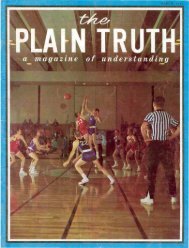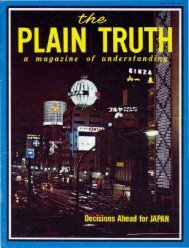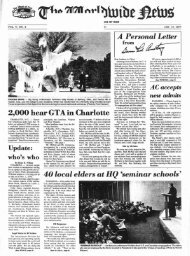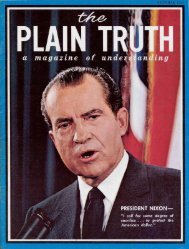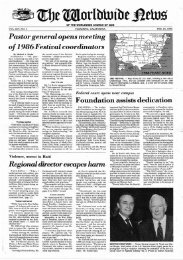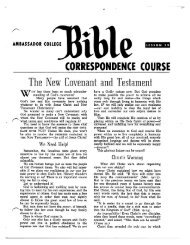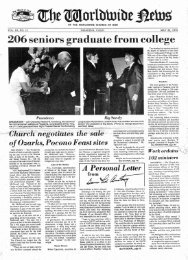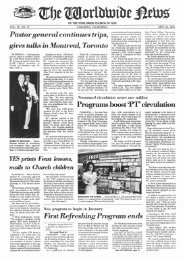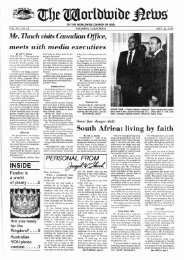Plain Truth 1978 (Prelim No 04) Apr - Herbert W. Armstrong
Plain Truth 1978 (Prelim No 04) Apr - Herbert W. Armstrong
Plain Truth 1978 (Prelim No 04) Apr - Herbert W. Armstrong
Create successful ePaper yourself
Turn your PDF publications into a flip-book with our unique Google optimized e-Paper software.
economic structure. The U.S. dollar<br />
has been eroding steadily for over a<br />
year. By the end of 1977 it broke<br />
through another downward barrier,<br />
falling below 240 Japanese yen to<br />
the dollar. Only five months before,<br />
the dollar was worth between 265<br />
and 270 yen.<br />
In Europe, the dollar during its<br />
1977 skid dropped perilously close<br />
to another milestone of decline: a<br />
ratio of two German marks to the<br />
doll ar. At the beginning of this<br />
decade the dollar was worth four<br />
marks.<br />
Massive Trade Deficit<br />
Concurrent with the dollar slide, the<br />
imbalance in America's foreign<br />
trade account has reached an alarming<br />
level. The U.S. trade deficitimp<br />
ort s of good s and services over<br />
export s-reached a staggering $26.7<br />
billion for 1977.<br />
Th e burdensome cost of imp orted<br />
fuel-$44 billion a year- accounted<br />
for most of America's trade shortfall.<br />
On his trip to several foreig n<br />
capitals in January. President Ca rter<br />
was urged by the lead ers of Saudi<br />
Ara bia to take urgent measures to<br />
prop up the saggi ng dollar- which<br />
was threatening the value of the $60<br />
billion the Sa udis have tied up in<br />
U.S. reserves.<br />
Significantly enough. Ca rter announced<br />
a support plan the day after<br />
his talks with King Kh alid and<br />
Crown Prince Fahd. Th e dollar immedi<br />
ately rebounded in a technical<br />
rally. But a ll experts agr ee th e<br />
plan-to borrow huge amounts of<br />
foreign currencies with which to sop<br />
up unwanted dollars-was, at best, a<br />
temporary measure . The only real<br />
answer. as the Shah of Iran lectured<br />
Mr. Carter on the same trip. is for<br />
Am erica to conserve energy, to buy<br />
far less imp orted fuel. However. the<br />
President's energy program remains<br />
logjammed in Congress, its critics<br />
claiming it doe s little to encourage<br />
the further recovery ofdomestic fuel<br />
sources.<br />
Protectionism on the Rise<br />
The imported fuel problem is crttical<br />
enough, but it is by no means<br />
the entire story.<br />
A sizable chunk of the U.S. trade<br />
deficit for 1977-$8.5 billion-was<br />
with one country: Japan, Japan reg-<br />
8<br />
istered a trade surplus for 1977 of<br />
around $17.5 billion. meaning the<br />
U.S. deficit in Japan-U.S. trade accounted<br />
for nearly half of the Asian<br />
nation's surplus.<br />
American officials warned the<br />
Japanese after the inconclusive De-<br />
up,<br />
cem ber 1977 trade negotiations that<br />
un less they came forth with a substa<br />
ntial. new set of proposals the rising<br />
choru s of protectionism in the<br />
United States would become a discordant<br />
roar. And the crescendo of<br />
protest comes not only from America.<br />
The Common Market countries<br />
are also wrestling with a huge $5<br />
billion annual trade deficit with Japan.<br />
And in the Australasia area.<br />
New Zealand's Prime Mini ster Robert<br />
Muldoon warn s that if Japan<br />
will not open its doors to more New<br />
Zealand beef and dairy products.<br />
his government will not continue to<br />
issue fishing licenses to Japanese<br />
ships to operate in its offshore<br />
waters.<br />
In words that reveal the at times<br />
acrid tone of the simmering int ernational<br />
trade fight . Muldoon<br />
warns: "It is time that Jap an is<br />
dragged, kicking and screa ming if<br />
necessary, into the modern internati<br />
onal trad e community."<br />
The Protectionist Momentum<br />
Members of the U.S. Congress are<br />
coming under increased pressure to<br />
do something about the loss of jobs<br />
in industry after indu stry du e to the<br />
impact o f lower-cost importe d<br />
goods. Administration free trad ers<br />
are losing friends in Congress and<br />
the labor movement at an alarming<br />
rate, according to a report in the<br />
December 19. 1977. Business Week.<br />
Seen instead is a renewed dri ve for a<br />
whole grab bag of tariffs and import<br />
quotas.<br />
"The uneasy mood is most apparent<br />
on the Hill." repo rts the magazin<br />
e. "Cong ressme n. reacting to<br />
pressures from cons tituencies. are<br />
besieging the office of Robert S.<br />
Stra uss . . . with teleph on e calls<br />
seeking help for one ind ustry or another.<br />
And the impatience is growing."<br />
Shoe s. steel. textiles. television<br />
sets. sugar: The list is long and the<br />
pressure is inte nse. "Even more disturbing<br />
to the Ad mi nistra tion:'<br />
adds Business Week. "is the defection<br />
of liberal trad e un ions. . . . In<br />
fact the last major un ion still supporting<br />
trad itional free-trade prin <br />
ciples is the United Auto Work ers.<br />
'Trade pro vides competition and<br />
competition holds down prices.' sa id<br />
the UAW's President Douglas Fraser<br />
last week. 'We tried protectionism<br />
once before. We got Smoot<br />
Hawley. the Depression , Hitler. and<br />
World War u. "<br />
Worldwide Steel Slowdown<br />
The Administration policy currently<br />
consists of trying to stamp out one<br />
brushfire at a time. An example of<br />
this piecemeal approach is the recently<br />
engineered "trigger-price"<br />
system which bars sales of impo rted<br />
steel below certain set prices based<br />
on a formul a assessing Japanese<br />
production costs.<br />
Washington was under intense<br />
pressure to shore up the American<br />
steel industry because imports had<br />
increased by almost 50 percent since<br />
The PLAIN TRUTH <strong>Apr</strong>il <strong>1978</strong>





